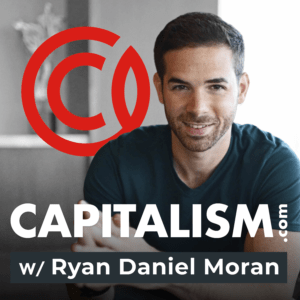This is part 2 of a 2-part discussion with Patrick Donohoe, the go-to wealth management guy for Ryan’s wealthiest peers and today’s discussion is centered on how everything comes back to ‘who’.
Where do The One Percent really invest their money for the highest ROI?
This second part of the interview explores this very idea.
Would you like to start learning and implementing the financial strategies of the worlds wealthiest people? Paradigm Life is offering a free Perpetual Wealth 101 Guide. Just visit please go to www.capitalism.com/paradigm for exclusive access to this free course that will take you down the path to financial independence.
Why Authentic Relationships Are a Prerequisite for Successful Investing
Relationships are an essential ingredient in the wealth building process.
This is the overarching message that can be gleaned from listening to the second part of Ryan’s interview with Patrick Donohoe on The One Percent podcast. Patrick is a millionaire entrepreneur who owns and runs Paradigm Life, an investment planning firm based in Salt Lake City, Utah. The company has a team of over 20 financial advisors who advise accomplished entrepreneurs on how they should invest their excess wealth to preserve and grow it.
In part one of the interview, Patrick shared a range of tips for entrepreneurs who are sitting on extra cash but are unable to efficiently redeploy that capital into their businesses and thus are looking for good investment opportunities to expand their portfolios.
In part two, he and Ryan have a candid conversation on the importance of relationship building as both an entrepreneur and an investor. They explain that at the end of the day the people (i.e., management and employees) that are behind a business will ultimately determine whether or not a return on investment (ROI) is realized and to what extent. This is why understanding the culture and systems of a business is important before investing in it. A company can have the greatest products and sales strategies in the world, however, without having the right corporate culture, it is only a matter of time before it will meet its own demise.
Below are three of the many gems of advice that can be garnered by listening to the interview.

There a Many Ways to Skin a Cat
The beauty of starting a new venture or investing in an existing business is that there is no right or wrong way to do it. This allows for one to be exercise creativity and flexibility in their wealth creation path.
During the podcast, Patrick shared his belief that, in general, finance is not nearly as complicated as people make it out to be. (See also, 10 Steps to Financial Freedom.)
He argued that it is a mistake to put too much energy into coming up with the right strategy or structure for a deal given that there are multiple ways in which one can arrive at the same end goal. The right strategy for you should come naturally after defining what it is you wish to achieve from your investments. This could be capital appreciation, wealth preservation, passive income and/or any combination of these.
As an example, if your investment goal is to create a passive income stream and have an opportunity to invest in a product idea. You might find structuring the deal using a revenue-based financing agreement to be attractive. This way you can earn a consistent flow of income as consumers purchase the product. On the other hand, if income isn’t a priority for you as an investor, it might be more ideal for you to take an equity stake in the business and cash out later when the brand is sold to a larger company.
So If the Deal Structure Isn’t the Most Important Thing, What Is?
One word – people.
The importance of people and company culture was reiterated throughout the podcast.
“Everything that has to do with money involves people,” Patrick noted, “There are successful businesses everywhere [and] they have been for hundreds of years. So why do businesses fail with all of the examples of successful businesses?” (For related readings see, 10 Incredibly Useful Tips on How to Franchise a Business.)
According to him, success and failures in business are largely dependent on the people within an organization. Ryan echoed the same sentiment and even went as far as to say that your corporate mission and the values of your employees are more important than the actual product that you are selling. His rationale is that a product merely represents the mission that your organization is trying to solve.

Systems Are Important
Given the fact that people are such an important factor in determining the eventual survival of an organization, proper systems need to be in place in order for employees to be managed efficiently. Patrick shared that his initial failure to see the importance of implementing such systems (having an employee handbook, as an example) has cost him a lot of money.
As a business scales, it becomes harder and harder to maintain the corporate culture and ethos that had brought the initial growth in the first place. Every time a new employee is hired, an organization runs the risk of diluting its unique corporate culture. For example, a company built on innovation needs to ensure that new hires are not afraid to take the risks needed to be innovative. Likewise, a frugally ran company could lose its core money management values if its new CFO previously worked at an organization that regularly made lavish purchases on non-essential items. (You might also like, How Successful Entrepreneurs are Bootstrapping Business in 2019.)
When looking at a potential investment, Patrick recommends that you look to see what type of systems are in place to maintain the corporate culture. These systems could be competitive compensation packages, training for both new and existing hires, continued education activities for management, and even effective communication channels between low level employees and management. If you come across a potential investment that lacks in such a system, this could be an opportunity for you to profit from the implementation of such systems.





